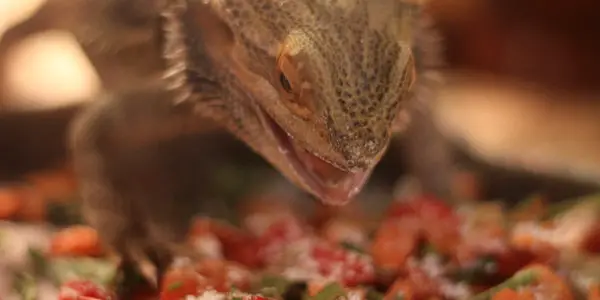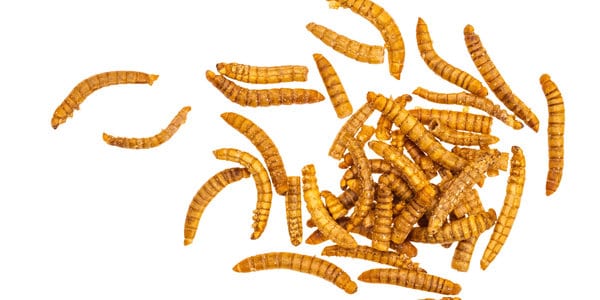Yes, adult bearded dragons can eat mealworms. However, it would be best if you don’t give them to juveniles as they cannot handle the chitin exterior of a mealworm. In addition, mealworms are high in phosphorous and fat but low in proteins and calcium, making them poor for bearded dragons.
Although mealworms are ideal for bearded dragons, you should not give them to the pet as stable food. They should supplement the beardie’s diet, only forming a small percentage of their diet. Besides mealworms, you may also give the bearded dragon adult beetles or pupae.
Mealworms are a popular meal among bearded dragon keepers because they are very affordable, easy to raise and maintain, big enough, and long-lasting s they can live for several months when refrigerated.
Mealworm’s Nutritional Value
Bearded dragons enjoy mealworms because of the high moisture content. They are also high in fats; surprisingly, they have more fat than other staple feeder insects such as crickets. Due to the high-fat content, bearded dragons like them more than other healthier foods or supplements.
However, the high-fat content increases the risk of obesity and hepatic lipidosis if your bearded pet dragon eats them daily. Further, they have low calcium content making them unideal.
| Nutrient | % Content |
| Moisture | 63% |
| Protein | 19% |
| Fat | 14% |
| Carbohydrates | 3% |
| Ash | 1% |
Advantages of Mealworms for Bearded Dragons
Having seen the nutritional value of mealworms, here are some of the advantages of these insects for your pet. They also explain why mealworms are popular among bearded dragon owners.
1. Cheap to Buy, Raise and Maintain
Mealworms are pretty cheap, which is part of the reason they are popular among bearded dragon owners. In addition, they are easy to raise. You only need a container, veggies, substrates, and a method of maintaining warmth between 70 and 80 degrees Fahrenheit. These are all you need for breeding mealworms.
2. Have A Long Lifespan
Mealworms can last for several months. You only need to refrigerate them between 45 and 50 degrees Fahrenheit, and they will become dormant but remain alive. During this time, remove them from the fridge for a day or two for feeding.
3. Big Size
Mealworms are big. As such, you only need a few for your pet. This makes them cost-efficient, and a few will go a long way.
Disadvantages of Mealworms for Bearded Dragons
As seen, mealworms can be beneficial to your pet, and there are also valid reasons why they are famous among fellow beardie pet owners. However, they should not be given in plenty. Because of how they move and smell, mealworms bearded dragons are attracted to them and might overindulge.
A good trick is mixing vegetation with mealworms. It makes your pet eat more green without overfeeding on the mealworms. Here are the major drawbacks of mealworms.
1. Low Calcium
Mealworms are low in calcium, making them not the best source of this mineral for your pet. Bearded dragons need plenty of calcium to support their bones growth, development, and maintenance needs. When they don’t get enough calcium, these lizards might suffer from metabolic bone disease.
Metabolic bone illness is the most common disease among captive bearded dragons. Its signs include swelling in the hind legs, face, or mouth, shaking limbs, and lethargy. In severe cases, your bearded dragon might have deformities or experience muscle twitching. If detected early, metabolic bone disease can be treated, but you should prevent your pet from getting the disease in the first place.
Given that mealworms are low in calcium, you need to include high calcium foods on your pet’s diet.
In addition, dust the pet’s food with calcium supplements to try to improve the dietary imbalance. It might not make mealworms healthier, but it improves the nutritional content of your pet’s diet. In addition, you should not replace other insects with mealworms in your bearded dragon’s diet, even if you dust them with calcium.
2. Low Calcium: Phosphorus Ratio
Bearded dragons need Calcium and Vitamin D3 to help their bodies absorb ingredients. High phosphorus content in foods such as mealworms prevents the formation and usage of Vitamin D3, thus hindering Calcium absorption.
A ratio ranging between 1.5:1 and 2:1 for calcium to phosphorus is ideal for beardies. However, this ratio is significantly lower in mealworms meaning that mealworms will not provide your bearded dragon with the ideal mineral ratio.
3. High In Fat
Mealworms are rich in fats, even though you can’t tell by looking at them. If fed in plenty, your pet might become overweight or obese. Being overweight in beardies can cause serious health problems such as prolapses, organs dysfunction, and dystocia. Two of the most common indicators are the pet having a saggy beard or a stomach that drags on the ground as it walks.
Captive bearded dragons don’t exercise as much as they would in the wild. Therefore, they are bound to build up weight faster than they would in the wild. Feeding captive bearded dragons with mealworms puts them at an even higher risk.
Limit the number of mealworms, especially if you often give your bearded dragon other high-fat foods or treats.

Can I Give My Baby Bearded Dragon Mealworms?
Mealworms have high-fat content. Coupled with the fact that they are pretty addictive, mealworms can make your baby bearded dragon gain weight quickly. If mealworms make up a significant part of your baby’s beardies diet, they will not consume enough minerals and vitamins.
In addition, mealworms have a hardy exoskeleton, with most of the commercial ones having about half-inch exoskeleton. It makes them big, thus difficult for your bearded dragon to bite, chew and digest. Their bodies cannot digest the tough exoskeleton.
The size of the mealworms may also cause impaction leading to spinal cord injuries in your pet or death. If you suspect that your baby bearded dragon is suffering from impaction, take it to the vet immediately.
A great alternative to feeding your bearded dragon with mealworms is giving them small Dubia roaches, pinhead crickets, fruit flies, wax worms, or any other tiny worms or insects that are easier to swallow.
How Many Mealworms Are Ideal To Feed A Bearded Dragon?
Mealworms can potentially make your bearded dragon obese when given in large quantities. Therefore, you should only give it very few mealworms. Ideally, once or twice a week is enough, with each meal having between 5 and 10 mealworms.
Remember that mealworms should only be given to bearded dragons aged 5-month plus. For those aged between 5 and 15 months, you can give them the worms more frequently because their protein and fat needs are higher than more mature ones due to their bodies’ growth and development needs. On the other hand, hatchlings and baby bearded dragons should be fed with ¾ proteins and ¼ greens.
Upon getting to adulthood, you should reduce the number of mealworms you feed your bearded dragon and aim to provide it with a more balanced diet comprising green vegetables and proteins. Mature ones need to eat more green and less protein.
It is best to give the pet these mealworms at the end of the feeding as a treat. Else, your bearded dragon might refuse to eat other healthier but less-attractive foods.

Frequently Asked Questions
Can A Mealworm Bite?
Most people believe that mealworms can harm reptiles owing to their strong bite. While it is true that mealworms have a strong bite, they don’t bite when held. Instead, they instinctively try to resist and attempt to escape by wiggling.
Even when they bite, it is not strong enough to harm your bearded dragon. In addition, a mealworm will die as soon as a bearded dragon bites it.
Are Mealworm Beetles Safe for Bearded Dragons?
Mealworm beetles have less fat and more proteins compared to mealworms. For this reason, they make a better choice for bearded dragons. Sadly, most bearded dragons don’t seem to fancy their taste.
Conclusion
Mealworms are safe for your bearded dragon. However, there are plenty of reasons why you should avoid them or limit their intake. Low calcium, high potassium, and high-fat levels make mealworms not an ideal part of your beardie’s staple diet.
In addition, they are addictive, which might make your pet choosy, and avoid eating other less attractive but highly-nutritious meals.
Limit the intake of mealworms for your beardie to once a month. It will act as a treat but also prevent potential health problems such as obesity and metabolic bone illness. If you opt to avoid mealworms for bearded dragons totally, this is also okay.
